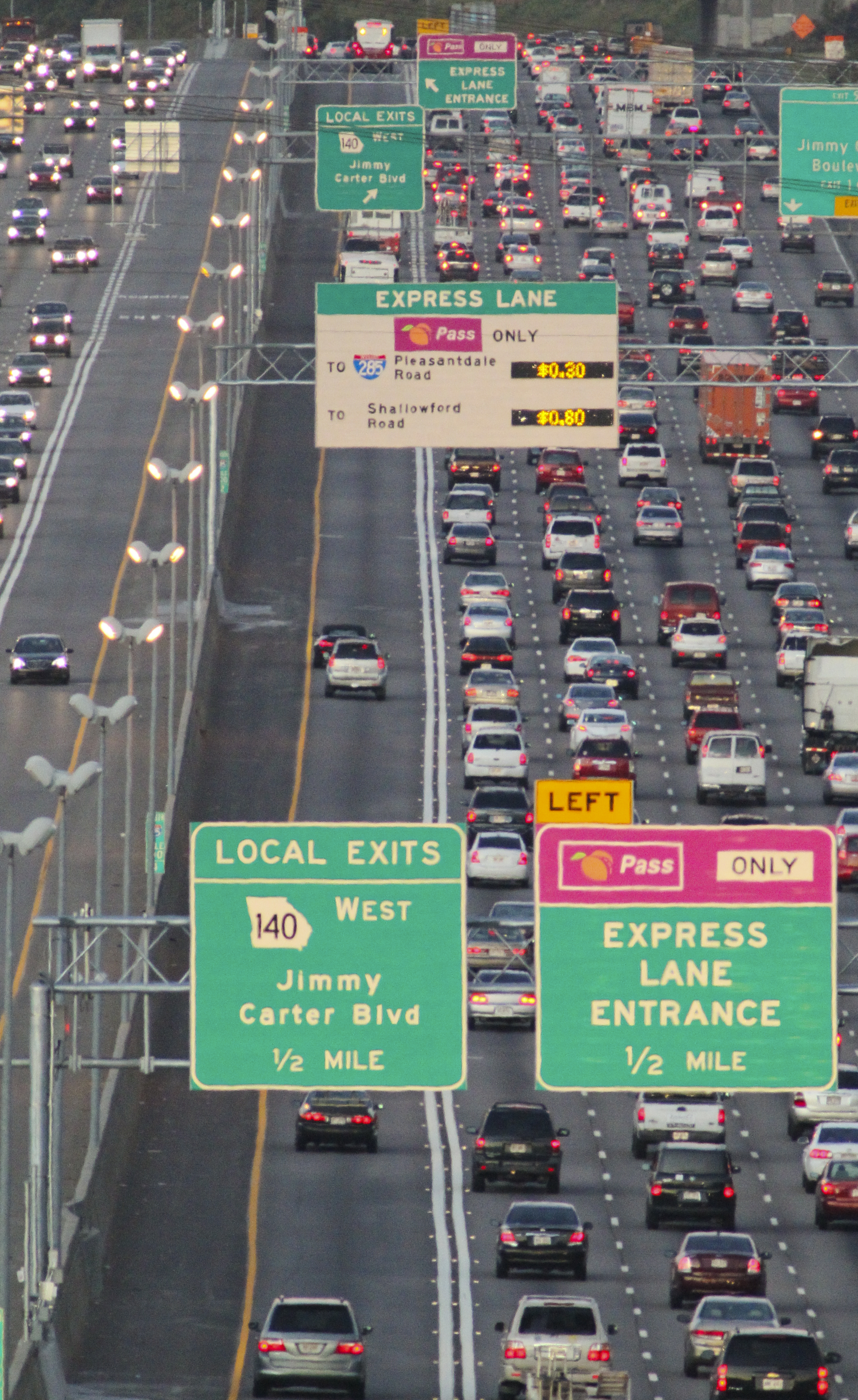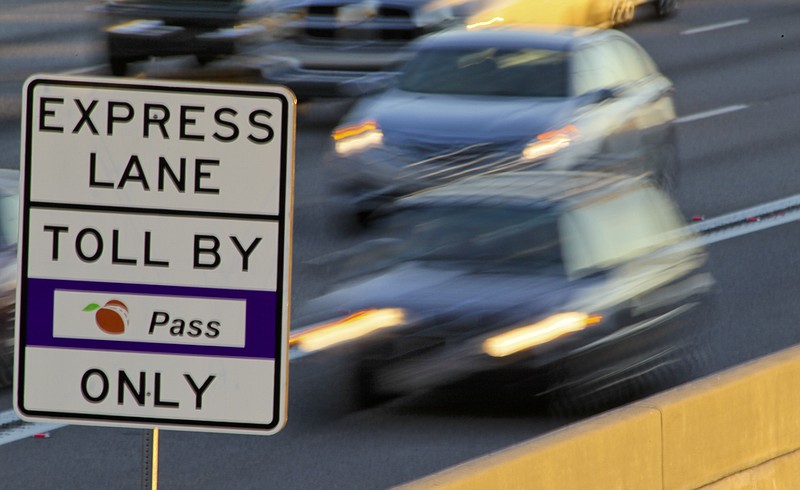NASHVILLE -- Citing a need for $26 billion in highway spending by 2040, Gov. Bill Lee's administration plans to ask lawmakers to authorize public-private partnerships to build and operate new dedicated toll lanes that are owned and operated by for-profit companies in highly congested areas throughout the state.
Attempting to steer clear of the word "tolls," Lee officials are seeking to rebrand the proposed special lanes that will charge motorists a fee to drive on them as "choice lanes."
They say drivers can opt to use them when other lanes are highly congested or bottlenecked. Georgia has a number of interstates and roads with similar special lanes that drivers choose to take.
"What we're looking at is what we call 'choice lanes' to give people a choice," state Transportation Commissioner Butch Eley told reporters last week as the Lee administration continued to elaborate on infrastructure needs, an issue the Republican governor raised during his Nov. 8 re-election victory speech in a landslide victory over an underfunded Democratic opponent.
Eley said Lee "is not for building toll roads from point A to point B, but what he is willing to consider is to look at how we can add additional lanes."
"What we're talking about doing here is additional capacity on the road -- we're not talking about (converting) existing lanes" to tolls, Eley said.
Some states, including New York and New Jersey, have used toll roads for decades. More recently, a number of other states, including Georgia, have jumped in to convert high occupancy vehicle lanes into toll lanes, offering varying pricing based on demand. Vehicle drivers purchase rechargeable transponders and pay varying prices to travel based on traffic volume.
Eley said the state has no interest in converting HOV lanes to toll lanes.
The commissioner highlighted highway funding problems during his budget hearing before the governor.
Lt. Gov. Randy McNally, the Republican Senate speaker from Oak Ridge, said in a statement that he agrees with the governor that infrastructure challenges and how the state deals with them will be "critical to how we grow as a state."
He said he also agrees Tennessee should not abandon its pay-as-you go system in which the state doesn't issue bonds for road construction as well as seeking to avoid increasing the tax burden on Tennesseans.
McNally, however, is stopping short of an endorsement of the choice lanes at this point.
"I appreciate Gov. Lee and Commissioner Eley starting this much-needed conversation, and I am looking forward to spirited discussions on the subject with my colleagues in the House and Senate this session," he said.
House Speaker Cameron Sexton, R-Crossville, issued a statement as well.
"We must have honest discussions on infrastructure in our state to solve the traffic congestion issue," Sexton's statement said. "Those must include expansion of rail access, shortening the decadeslong timeline to build roads, as well as looking at express lanes on our interstates in highly congested areas.
"I do not foresee Tennessee having toll booths or mandatory toll roads; however, I do believe giving drivers a choice to travel on roadways or an expressway will be part of the discussion," Sexton said. "There are a lot of details that still need to be worked out, but I greatly appreciate Gov. Lee and Commissioner Eley for looking at many alternatives to solve our growing congestion issue."
Lee is avoiding asking lawmakers to hike gas and diesel taxes. The taxes were last raised in 2017 during then-Gov. Bill Haslam's administration. GOP lawmakers balked at fellow Republican Haslam's original ask for his Improve Act, which in addition to raising fuel taxes sought to index them to the consumer price index.
Lawmakers instead ditched the indexing provision and slashed proposed increases to gas and diesel taxes from their original amount, resulting in a 6-cent-per-gallon boost for gas and 10 cents for diesel. That resulted in Tennessee's current 26-cents-per-gallon tax rate for gas and 27 cents for diesel when it passed.
Legislators also cut a number of other taxes and eliminated an income tax on investments. In the end, the deal cut more taxes than were raised.
"All we're doing here is asking for the ability to look at this as an option," Eley told reporters last week about the choice lanes. "Right now, we can't do what other states around the country are doing as it relates to public-private partnerships."
The commissioner said to avoid trying to raise fuel taxes or take on bonded indebtedness, the state can explore toll lanes, raise the current $100 annual fee on electric vehicles to $300 and implement cost savings in highway construction.
In the current budget, Lee last year threw in an additional $700 million in one-time money from surpluses into road projects. The money was generated as a result of the State Funding Board's annual and deliberate low-balling of revenue estimates.
The Lee administration recently launched a new website called "Build With Us," serving up what it sees as solutions to addressing a growing funding shortfall to address worsening congestion on state roads.
"We aren't going to raise the gas tax, and we aren't going to take on debt," the site says. "With a lack of revenue and a necessity to build, we have looked to our peer states such as Texas, Florida, Georgia, North Carolina and Virginia on how they have addressed similar problems: public-private partnerships."
The mechanism allows a private sector partner to enter an agreement with a state to design, build, finance, operate and maintain infrastructure projects.
"We believe Tennessee's construction industry providers will continue to build the $1.2 billion annual construction and maintenance program plus the projects created through alternative revenue sources," the administration's website states.
Lee and Eley noted during last month's annual budget presentations that $26 billion is needed over and above the 2017 Improve Act to address both urban and rural congestion in the state. That includes nearly $14 billion in the four major urban areas -- Nashville, Memphis, Chattanooga and Knoxville. Another $12 billion is needed on Tennessee's rural interstates.
"I think definitely we have to look at a new funding plan for Tennessee," House Finance Committee Chairwoman Patsy Hazlewood, R-Signal Mountain, said by phone last week. "I just think it's going to be an interesting discussion as we go through session. I think, sort of like the education (bill) last year, everybody is committed and recognizes the problem. Coming to a consensus of what the solutions may be may take a lot of time."
Rep. Yusuf Hakeem, D-Chattanooga, said by phone the idea is worth exploring.
"We do, looking forward, have a potential problem of having enough funding or revenue to deal with the necessary roads," Hakeem said, "but I wouldn't want to just write off on that at this time. I think there's a lot of study and understanding we need in regards to it."
Senate Minority Leader Jeff Yarbro, D-Nashville, said by phone last week the devil is in the details on funding mechanisms like this.
"I think there's an important conversation to have with commuters, especially in suburban areas, about the details of these 'choice lanes' and how the governor's proposing they will work and ensuring that we've got a fair system," Yarbro said. "And there's been some historic hesitation around charging drivers tolls or lane fees or whatever we're planning to call them."
Contact Andy Sher at asher@timesfreepress.com. Follow him on Twitter @AndySher1.
 Atlanta Journal-Constitution file photo / Traffic makes its way south on Interstate 85 towards Atlanta as some commuters choose to avoid congestion by using the express lanes. Tennessee Gov. Bill Lee is considering similar lanes in the Volunteer State as a way to get more money for highway construction.
Atlanta Journal-Constitution file photo / Traffic makes its way south on Interstate 85 towards Atlanta as some commuters choose to avoid congestion by using the express lanes. Tennessee Gov. Bill Lee is considering similar lanes in the Volunteer State as a way to get more money for highway construction.